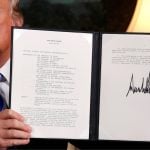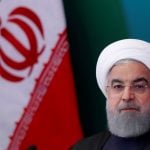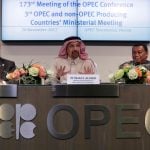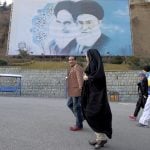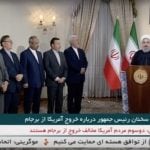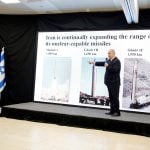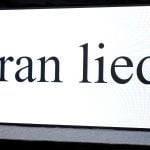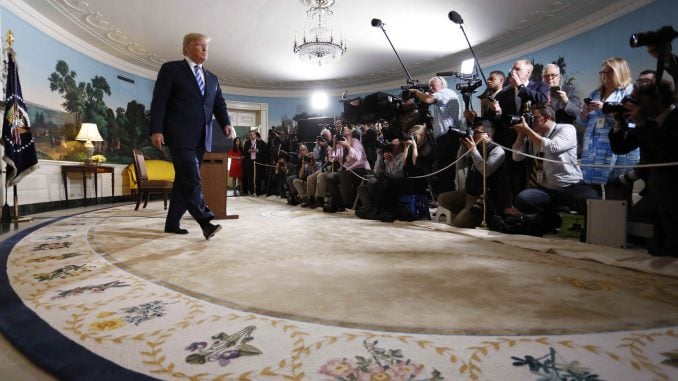
WASHINGTON, D.C. — President Donald Trump said on Tuesday he was reimposing economic sanctions on Iran and pulling the United States out of an international agreement aimed at stopping Tehran from obtaining a nuclear bomb.
Critics of administration’s stance on Iran have said that the decision could risk conflict in the Middle East, upset America’s European allies and disrupt global oil supplies. However, supporters have said that Iran is violating the 2015 agreement and it does not stop Iran from getting in regional conflicts or stop its other missile programs.
“I am announcing today that the United States will withdraw from the Iran nuclear deal,” Trump said at the White House. “In a few moments, I will sign a presidential memorandum to begin reinstating U.S. nuclear sanctions on the Iranian regime. We will be instituting the highest level of economic sanctions.”
Trump said he was willing to negotiate a new deal with Iran, but Tehran has already ruled that out and threatened unspecified retaliation if Washington pulled out.
European allies sought to salvage the international nuclear pact with Iran. Britain’s Foreign Secretary Boris Johnson said he had no problem with Trump’s goal for a lasting solution to Iran’s nuclear threat and other Iranian policies seen as malign by London and Washington, but added: “The question is: how does the U.S. propose to achieve it?”
“Now that the Trump administration has left the JCPOA, the responsibility falls on them to describe how they in Washington will build a new negotiated solution to our shared concerns,” Johnson told parliament.
“The deal is not dead. There’s an American withdrawal from the deal but the deal is still there,” French Foreign Minister Jean-Yves Le Drian said.
Iranian Supreme Leader Ayatollah Ali Khamenei, who had been reluctant to back the deal, said: “Mr Trump, I tell you on behalf of the Iranian people: You’ve made a mistake…I said many times from the first day: don’t trust America.”
The European Union said it would remain committed to the deal and would ensure sanctions on Iran remain lifted, as long as Tehran meets its commitments.
The Kremlin said Russian President Vladimir Putin was “deeply concerned” by the withdrawal, the RIA news agency said.
Merkel said that, while the existing deal should not be called into question, there should be discussion of “a broader deal that goes beyond it,”
Macron’s contact with Rouhani will be followed by meetings next week involving the Iranians and European counterparts from France, Britain and Germany.
Trump said he would reimpose U.S. economic sanctions on Iran to undermine what he called “a horrible, one-sided deal that should have never, ever been made,” which was “defective at its core.”
The 2015 deal, worked out by the United States, five other international powers and Iran, eased sanctions on Iran in exchange for Tehran limiting its nuclear program. The signature foreign policy achievement of Trump’s predecessor, Barack Obama, does not address Iran’s ballistic missile program, its nuclear activities beyond 2025 nor its role in conflicts in Yemen and Syria.
“The Obama administration negotiated with the Iranian regime under the terribly misguided operating principle that any deal — even a bad deal — was better than no deal. … The end result was a deal that failed to cut off Iran’s path to nuclear weapons.” Sen. Thom Tillis (R-N.C.)
Renewing sanctions would make it much harder for Iran to sell its oil abroad or use the international banking system.
Iranian state television said on Tuesday that Trump’s decision to withdraw was “illegal, illegitimate and undermines international agreements.”
The Iran deal may remain partially intact, even without the United States. Iranian President Hassan Rouhani suggested on Monday that Iran could remain in the accord with the other signatories that stay committed to it.
European allies such as France, Britain and Germany must now decide their own course of action with Tehran. China and Russia are also signatories to the Iran deal.
Without detailing “highest economic sanctions,” Trump implied that he was going beyond not renewing waivers on sanctions related to Iran’s oil exports and its central bank that were due to expire on Saturday and reimpose all of the other U.S. sanctions that were suspended under the nuclear deal.
The U.S. Treasury followed Trump’s announcement saying that it will begin implementing a 90- and 180-day wind-down period for activities involving Iran that were consistent with U.S. sanctions being lifted. After than it will impose sanctions on transactions with Iran’s central back and designated financial institutions.
“We parliamentarians, of different political affiliations, support the establishment’s stance against renegotiating the (nuclear) deal. America cannot impose its illegitimate demands on Iran … and ignore Iran’s rights,” they said in a letter addressed to Iran’s Supreme Leader Ayatollah Ali Khamenei.
Among the few nations to welcome Trump’s decision were Israel and Saudi Arabia, Iran‘s arch-foes in the Middle East.
Last week, Israeli Prime Minister Benjamin Netanyahu held a press conference revealing thousands of documents that he said shows Iran had continued its nuclear program secretly after the agreement was signed in 2015. Standing in front of a giant screen that read “Iran Lied,” Netanyau called on the world to either fix the deal or cancel it.
“President Donald Trump took a brave and correct decision to cancel the nuclear deal with Iran, which was a recipe for disaster, a disaster for our region, a disaster for the peace of the world.” Israeli Prime Minister Benjamin Netanyahu said on Tuesday.
Less than 24 hours after Trump’s announcement, Saudi Arabia said it had intercepted missiles fired at Riyadh by the Iran-aligned Houthi forces it is fighting in Yemen.
Oil prices initially slumped on conflicting headlines about Trump’s intentions, rebounded after Trump’s announcement at the end of the trading session, and then sold off again at the close. Overall the S&P energy sector trimmed initial losses to trade down 0.1 percent.
“DEATH TO AMERICA!”
Lawmakers in Iran‘s parliament burned a U.S. flag and a symbolic copy of the deal, known officially as the Joint Comprehensive Plan of Action (JCPOA), chanting “Death to America!.”
President Hassan Rouhani, a reformist who had hoped that the deal would boost living standards in Iran, struck a more pragmatic tone in a televised speech, saying Iran would negotiate with European Union countries, China and Russia.
“If at the end of this short period we conclude that we can fully benefit from the JCPOA with the cooperation of all countries, the deal will remain,” he said.
Trump’s decision adds to the strain on the transatlantic alliance since he took office 16 months ago. One by one, European leaders came to Washington and tried to meet his demands, while pleading with him to preserve the deal.
The Trump administration kept the door open to negotiating another deal with allies, but it is far from clear whether the Europeans would pursue that option or be able to convince Iran to accept it.
China’s foreign ministry said Beijing would defend the deal and urged parties “to assume a responsible attitude.”
Abandoning the pact was one of the most consequential decisions of Trump’s “America First” policy, which has led him to quit the global Paris climate accord, bring China to the table over trade, and pull out of an Asian-Pacific trade deal.
It also appeared to reflect the growing influence within the administration of Iran hawks such as new National Security Adviser John Bolton and Secretary of State Mike Pompeo, who arrived in Pyongyang on Wednesday to prepare for a summit that Trump hopes will secure North Korea’s denuclearisation.
Iran is the third-largest member of the Organization of the Petroleum Exporting Countries and pumps about 3.8 million barrels per day of crude, or just under 4 percent of global supply. China, India, Japan and South Korea buy most of its 2.5 million bpd of exports.
Its rial currency plunged to a record low against the U.S. dollar in the free market, after sliding for months because of a weak economy, financial difficulties at local banks and heavy demand for dollars among Iranians who feared that renewed U.S. sanctions would hit Iranian exports hard.
“I am scared,” 47-year-old Isfahan school teacher Morad Sabzevari said by telephone. “I listened to Trump’s speech on English news channels last night…It was a declaration of war against Iran… It means dark days and months are ahead of us.”
The U.S. Treasury says sanctions related to Iran‘s energy, auto and financial sectors will be reimposed in three and six months.
U.S. Treasury Secretary Steve Mnuchin said a license for Boeing Co to sell passenger jets to Iranwill be revoked, scuttling a $38 billion deal. The ban will also hit Europe’s Airbus, whose planes contain U.S.-made parts.
Trump said the nuclear agreement did not prevent Iran from cheating and continuing to pursue nuclear weapons.
“It is clear to me that we cannot prevent an Iranian nuclear bomb under the decaying and rotten structure of the current agreement,” he said.
Iran‘s growing military and political power in Yemen, Syria, Lebanon and Iraq worries the United States, Israel and Washington’s Gulf Arab allies such as Saudi Arabia.

